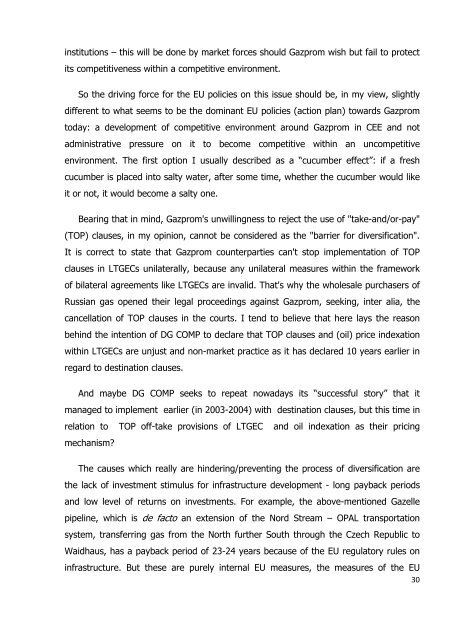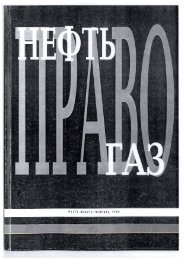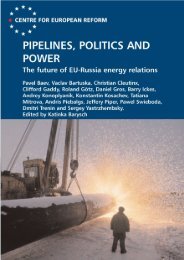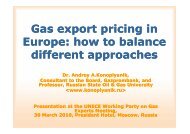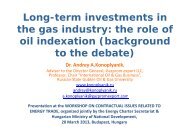Oil, Gas & Energy Law Intelligence
Oil, Gas & Energy Law Intelligence
Oil, Gas & Energy Law Intelligence
You also want an ePaper? Increase the reach of your titles
YUMPU automatically turns print PDFs into web optimized ePapers that Google loves.
institutions – this will be done by market forces should Gazprom wish but fail to protectits competitiveness within a competitive environment.So the driving force for the EU policies on this issue should be, in my view, slightlydifferent to what seems to be the dominant EU policies (action plan) towards Gazpromtoday: a development of competitive environment around Gazprom in CEE and notadministrative pressure on it to become competitive within an uncompetitiveenvironment. The first option I usually described as a “cucumber effect”: if a freshcucumber is placed into salty water, after some time, whether the cucumber would likeit or not, it would become a salty one.Bearing that in mind, Gazprom's unwillingness to reject the use of "take-and/or-pay"(TOP) clauses, in my opinion, cannot be considered as the "barrier for diversification".It is correct to state that Gazprom counterparties can't stop implementation of TOPclauses in LTGECs unilaterally, because any unilateral measures within the frameworkof bilateral agreements like LTGECs are invalid. That's why the wholesale purchasers ofRussian gas opened their legal proceedings against Gazprom, seeking, inter alia, thecancellation of TOP clauses in the courts. I tend to believe that here lays the reasonbehind the intention of DG COMP to declare that TOP clauses and (oil) price indexationwithin LTGECs are unjust and non-market practice as it has declared 10 years earlier inregard to destination clauses.And maybe DG COMP seeks to repeat nowadays its “successful story” that itmanaged to implement earlier (in 2003-2004) with destination clauses, but this time inrelation to TOP off-take provisions of LTGEC and oil indexation as their pricingmechanism?The causes which really are hindering/preventing the process of diversification arethe lack of investment stimulus for infrastructure development - long payback periodsand low level of returns on investments. For example, the above-mentioned Gazellepipeline, which is de facto an extension of the Nord Stream – OPAL transportationsystem, transferring gas from the North further South through the Czech Republic toWaidhaus, has a payback period of 23-24 years because of the EU regulatory rules oninfrastructure. But these are purely internal EU measures, the measures of the EU30


